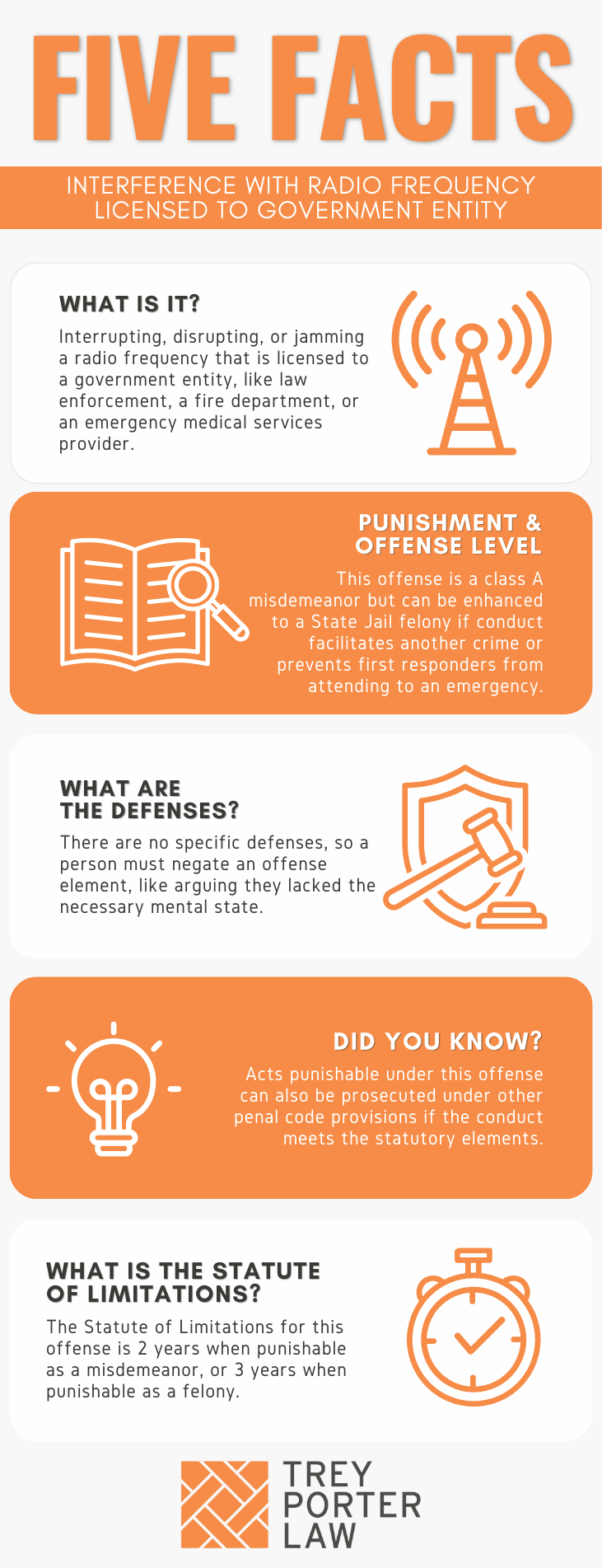WHAT IS INTERFERENCE WITH RADIO FREQUENCY LICENSED TO GOVERNMENT ENTITY IN TEXAS?
The Texas law against interference with radio frequency licensed to a government entity prohibits interrupting, disrupting, impeding, jamming, or otherwise interfering with emergency-use radio equipment or frequencies.

WHAT IS THE INTERFERENCE WITH RADIO FREQUENCY LICENSED TO GOVERNMENT ENTITY LAW IN TEXAS?
Tex. Penal Code § 38.152. INTERFERENCE WITH RADIO FREQUENCY LICENSED TO GOVERNMENT ENTITY.
(a) A person commits an offense if, without the effective consent of the law enforcement agency, fire department, or emergency medical services provider, the person intentionally interrupts, disrupts, impedes, jams, or otherwise interferes with a radio frequency that is licensed by the Federal Communications Commission to a government entity and is used by the law enforcement agency, fire department, or emergency medical services provider.
(b) An offense under this section is a Class A misdemeanor, except that the offense is a state jail felony if the actor committed the offense with the intent to:
(1) facilitate the commission of another offense; or
(2) interfere with the ability of a law enforcement agency, a fire department, or an emergency medical services provider to respond to an emergency.
(d) If conduct constituting an offense under this section also constitutes an offense under another section of this code, the actor may be prosecuted under either section or under both sections.
WHAT IS THE PENALTY CLASS FOR INTERFERENCE WITH RADIO FREQUENCY LICENSED TO GOVERNMENT ENTITY IN TEXAS?
Interference with a radio frequency licensed to a government entity is a Class A misdemeanor, punishable by up to one year in jail. If a person interferes with a government-licensed radio frequency to commit another crime, or to interfere with the ability of first responders and law enforcement to respond to an emergency, it is a state jail felony, punishable by 180 days to two years in a state jail facility.
WHAT IS THE PUNISHMENT RANGE FOR INTERFERENCE WITH RADIO FREQUENCY LICENSED TO GOVERNMENT ENTITY IN TEXAS?
The punishment range for interference with a radio frequency licensed to a government entity charged as a Class A misdemeanor is up to one year in jail, and a maximum $4,000 fine. If charged as a state jail felony, the punishment range is between 180 days and two years in a state jail facility, and a maximum $10,000 fine.
WHAT ARE THE PENALTIES FOR INTERFERENCE WITH RADIO FREQUENCY LICENSED TO GOVERNMENT ENTITY IN TEXAS?
A person charged with interference with a radio frequency licensed to a government entity may be placed on probation after a conviction, or deferred adjudication without a conviction. The maximum supervision period for a Class A misdemeanor is two years. The community supervision term for a state jail felony ranges between two and five years, with the possibility of extending supervision for up to ten years.
WHAT ARE THE DEFENSES TO INTERFERENCE WITH RADIO FREQUENCY LICENSED TO GOVERNMENT ENTITY IN TEXAS?
The statute does not authorize specific defenses to interference with radio frequency licensed to a government entity. A person accused thereof may attempt to negate at least one of the elements the State must prove at trial.
WHAT IS THE STATUTE OF LIMITATIONS FOR INTERFERENCE WITH RADIO FREQUENCY LICENSED TO GOVERNMENT ENTITY IN TEXAS?
The limitation period for interference with a radio frequency licensed to a government entity categorized as a Class A misdemeanor is two years. If classified as a state jail felony, the limitation period is three years.
INTERFERENCE WITH RADIO FREQUENCY LICENSED TO GOVERNMENT ENTITY IN TEXAS
The Texas legislature enacted this law in response to theft of emergency-use radio equipment that directly interfered with emergency response and law enforcement efforts. Radio equipment stolen during an emergency was used to disrupt or jam radio frequencies used by emergency responders, which posed a significant problem without an appropriate criminal penalty. This law addresses conduct beyond theft, and punishes the resulting interference with an emergency.
















